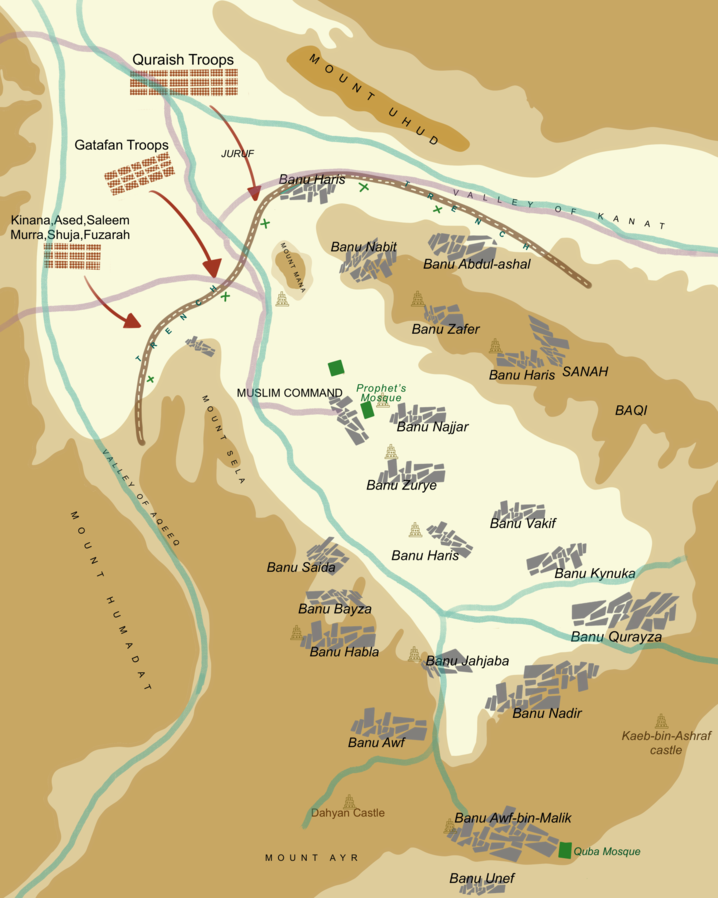Bismillah.
To win, you must think outside the box.
The Battle of the Trench (also known as the Battle of Khandaq) took place in 627 CE, during the fifth year of Hijra.
This battle was a pivotal moment in Islamic history, where the Muslim community in Medina faced a massive coalition of Meccan tribes and their allies.
Background
The Quraysh, along with other Arab tribes, sought to eliminate Islam after the previous defeats at Badr and Uhud.
To counter the threat, Prophet Muhammad (PBUH) was informed by Salman al-Farsi (RA), a Persian companion, about a strategy used in Persia: digging a trench around the vulnerable parts of Medina.
The Muslims quickly adopted this strategy, with the Prophet himself participating in the labor.
The Siege and Strategy
When the coalition forces, numbering around 10,000, arrived at Medina, they were confronted by the unexpected trench.
Unable to cross the trench and engage in direct combat, the Quraysh were forced into a siege.
The Muslims, though vastly outnumbered (around 3,000), held their defensive positions for almost a month, enduring harsh conditions, hunger, and the constant threat of attack.
Several skirmishes took place, but the trench strategy prevented the enemy from launching a full-scale assault.
One notable incident was when Amr ibn Abd Wudd, a famous warrior from the Quraysh, managed to cross the trench but was ultimately defeated in combat by Ali ibn Abi Talib (RA).
Divine Intervention & Victory
As the siege dragged on, internal dissent began to weaken the alliance of the Quraysh.
Furthermore, a fierce storm—seen as divine intervention—ravaged the enemy camp, destroying their equipment and morale.
Realising the futility of their efforts, the coalition forces retreated in disarray, marking a significant victory for the Muslims.
Legacy
The Battle of the Trench showcased the brilliance of defensive strategy and the importance of unity within the Muslim community.
The Quraysh’s failure to defeat the Muslims despite their overwhelming numbers significantly weakened their power and prestige.
It also cemented the leadership of Prophet Muhammad (PBUH) and boosted the morale of the Muslim community.
Application Today
The Battle of the Trench serves as a reminder of the importance of strategic thinking, perseverance, and unity in the face of overwhelming odds.
It highlights how faith, combined with action and innovative solutions, can lead to success even in the most challenging circumstances.
Let us remind ourselves of this event when we are facing challenges in our lives.
We must think outside the box like Salman (RA).
There is always a solution to our problems; whether it’s financial, emotional, or physical.
We need to think about our previous experiences (like Salman RA) and be a little creative.
And if any obstacle comes in our way, we must not let it distract us from our plan.
Just like Ali (RA) defeated Amr ibn Abd Wudd courageously, we must extinguish any distractions from our goals.
Conclusion
The Battle of the Trench was not just a military victory but a testament to the strength of the Muslim community under the leadership of Prophet Muhammad (PBUH).
It reinforced the belief that faith and determination, combined with practical strategies, can overcome seemingly insurmountable challenges.
This victory further solidified the Muslims’ position in Arabia and paved the way for the eventual conquest of Mecca.
May Allah (SWT) bless us with the faith to trust His (SWT) plan and grant us the wisdom to think outside the box.
Ameen!
